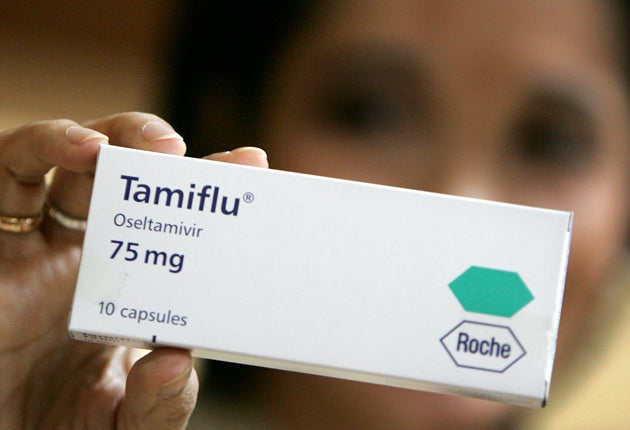'Shocking example of incompetence' over stockpiled flu drug Tamiflu
Public Accounts committee says storage mistake cost taxpayers £74m - for an antiviral that has divided experts over its effectiveness

Your support helps us to tell the story
From reproductive rights to climate change to Big Tech, The Independent is on the ground when the story is developing. Whether it's investigating the financials of Elon Musk's pro-Trump PAC or producing our latest documentary, 'The A Word', which shines a light on the American women fighting for reproductive rights, we know how important it is to parse out the facts from the messaging.
At such a critical moment in US history, we need reporters on the ground. Your donation allows us to keep sending journalists to speak to both sides of the story.
The Independent is trusted by Americans across the entire political spectrum. And unlike many other quality news outlets, we choose not to lock Americans out of our reporting and analysis with paywalls. We believe quality journalism should be available to everyone, paid for by those who can afford it.
Your support makes all the difference.Health officials spent £424 million stockpiling a flu drug that has divided experts over how effective it is, a public spending watchdog found.
Around 6.5 million units of the Tamiflu bought by the Department of Health also had to be written off because it could not guarantee the antiviral had been stored correctly, the National Audit Office said.
That mistake cost taxpayers £74 million - a "shocking example of incompetence" according to Public Accounts committee chairwoman Margaret Hodge.
The NAO began investigating after a number of MPs raised concerns about the decision to stockpile Tamiflu.
It said that while there is a general consensus that the drug reduces the duration of influenza and, in certain circumstances, prevents it, there is less agreement about how effective it is in preventing complications like pneumonia, reducing the need for hospital treatment or lowering death rates.
Of the 40 million units of Tamiflu bought, a quarter were written off. Some 6.5 million of those were ditched before reaching the end of their shelf life in 2009-10 because the department was unable to verify that the stock, distributed to the NHS during that year's pandemic, had been stored correctly.
The department began stockpiling Tamiflu in 2006 in response to the increasing concerns about bird flu.
Overall, £560 million was spent on antiviral medicine - £424 million on Tamiflu and £136 million on back-up drug Relenza - between 2006/7 and 2012/13.
Additional stocks of Tamiflu are due to reach their end of shelf life and be replaced during 2013-14 at a cost of £49 million, the NAO said.
Mrs Hodge said: "It is extremely worrying to find that the Government spent £424 million stockpiling 40 million units of Tamiflu between 2006-07 and 2012-13 despite there being question marks over the effectiveness of the drug.
"Although Tamiflu speeds up recovery times, experts do not agree over its ability to reduce complications and hospitalisations.
"In a shocking example of incompetence, £74 million of taxpayers' money was squandered when 6.5 million units of Tamiflu were written off because of poor record keeping by the NHS. There is simply no excuse for this waste.
"It is important that the National Institute for Health and Care Excellence (Nice) and the Medicines and Healthcare products Regulatory Agency (MHRA) assure themselves that they have all clinical trials information. It is essential, not only for the public purse, but for public safety, that the Department of Health carefully examine how it stockpiles medicines in the future."
PA
Join our commenting forum
Join thought-provoking conversations, follow other Independent readers and see their replies
Comments